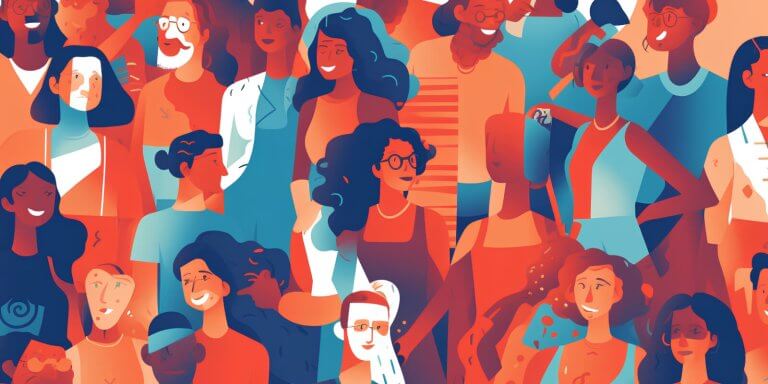Table of Contents
75% of companies don’t have DEI training in their leadership development programs, according to The Real Story of Diversity and Inclusion report.
But if you’re reading this, you’re part of the 25% that cares about diversity, equity, and inclusion. You want your company to lead differently when it comes to creating a more inclusive and equitable workplace, which is reasonable, considering DEI training fosters healthy and inclusive work environments.
DEI training or ‘inclusion training’ is more important than just fulfilling a mandatory requirement. It’s an opportunity to truly drive positive change. For it to be successful, it needs to come from the business strategy, be owned by the entire organization, and then be backed up by HR initiatives – it cannot exist within a vacuum.
With that, let’s look at why your organization needs to prioritize DEI strategy and training and how to ensure its success.
What is DEI Training?
DEI training is a type of professional training that teaches a company’s workforce how to create a work environment that is diverse, equitable, and inclusive for all. If done right, this training becomes an integral part of your company’s business strategy. It addresses the more covert and disguised forms of biases, underlying prejudice, and structural inequity, which are often based on race, sexual orientation, socioeconomic or ethnic background.
DEI is an abbreviation that stands for diversity, equity, and inclusion:
The training addresses people’s overlooked pain points and encourages open dialogues around uncomfortable and less discussed topics.
The Importance of DEI Training
As we’ve established, DEI training can be a powerful tool when executed properly, not only for the employees but also for the company’s bottom line. In the 2021 Happiness Index report by CNBC|SurveyMonkey Workforce, it was found that 78% of workers say it is important to them to work at an organization that prioritizes workplace diversity and inclusion.
Imagine being able to attract and retain top talent to your organization. That’s what having a dedicated and effective diversity, equity, and inclusion training program will do for you. Showing employees you care about their safety and well-being indirectly increases their job satisfaction; better job satisfaction means higher productivity and greater profits!
3 Benefits of DEI Training
In addition to attracting and retaining top talent and increasing your organization’s profits, there are a host of other benefits, too – let’s explore them:
⁃ Employee happiness
A survey revealed that workers are happier when they are pleased with their company’s DEI efforts. A diverse workforce and inclusive culture help employees feel a greater sense of belonging and connection. They don’t feel isolated but valued and welcomed regardless of their background or who they are. A happy employee is engaged, productive, and more invested in their work.
⁃ Improved company reputation
Millennials, Gen Z workers, and consumers are more socially conscious than ever. These groups require companies today to show their dedication to issues that concern workers and society, like diversity, equity, and inclusion.
💡In fact, a recent generational impact study conducted at Marlee found that Gen Z is particularly focused on fostering an inclusive work culture, making it a critical factor for attracting and retaining talent from this demographic.
Google, for example, has been leading the industry in DEI training and initiatives, and according to employees, people feel more comfortable discussing race and ethnicity openly.
On the other hand, makeup brand Youthforia is an example of a company with a ruined reputation because of poor DEI training. They were recently caught up in a scandal and accused of not being diverse or inclusive after releasing a foundation shade intended to match the darkest of skin tones. After launching the product, multiple dark-skin creators tried the brand and verified that the shade was in fact, jet black. No undertones. Just black.
This scandal revealed Youthforia to be lacking in the diversity department. They rushed to release a product that wasn’t vetted or tested on people with dark skin tones. The launch and rollout of this product was lazy and showed a lack of empathy and unfortunately, has tainted their reputation.
⁃ Innovation
With greater DEI efforts, you attract talent from various backgrounds with different skills, perspectives, and experiences. These people bring different characters and innovative ideas that elevate the organization. DEI training also makes existing staff feel more respected and embraced in the company, encouraging them to contribute more.
Types of DEI Training Programs
DEI training comes in different types and is carried out for a multitude of reasons. For instance, if your organization has a geographically distributed workforce, then you could carry out diversity, cultural sensitivity, and possibly microaggression training.
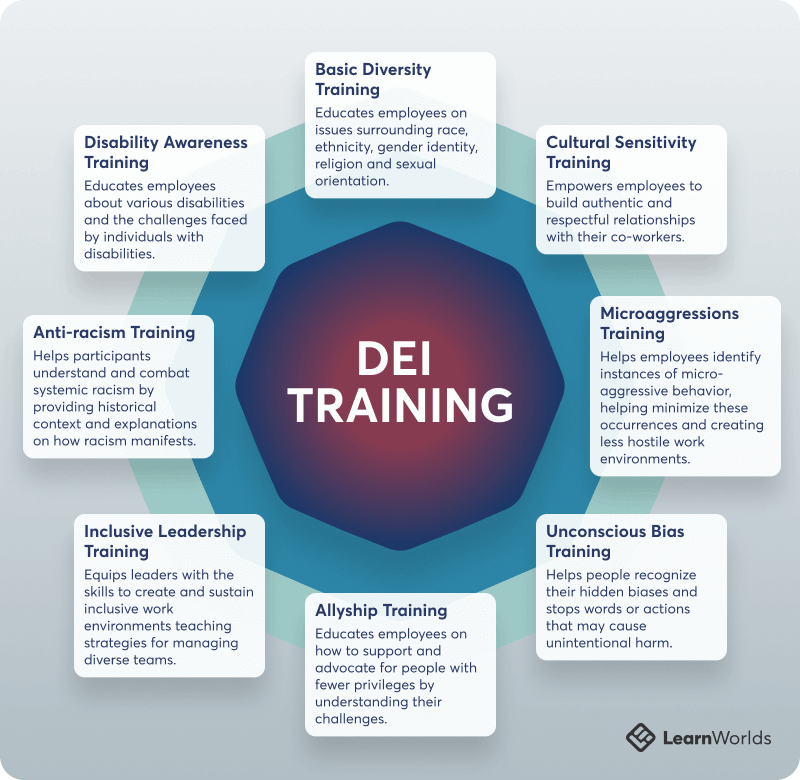
It’s important to know the different types so you choose the best one based on your company goals and strategies. Here are some common types:
Different types of DEI training can be leveraged to different ends depending on your organization’s needs and culture. So, when choosing what to focus your training on, remember that every company is unique, and no two companies will require precisely the same kinds of training. Let’s explore a few topics you should include in every DEI training program.
Topics to Cover in DEI Training Programs
The topics covered in DEI training will depend on the type of training being taught and your organization’s goals. However, you should include certain topics in every type of training. Let’s take a look at some of them:
Every topic covered in DEI training should provide flexible tools that can help foster inclusive attitudes and improve workplace culture. It should also create opportunities for feedback and dialogue and improve everyday relations between team members.
With your knowledge of the different types of training programs and the topics they cover, let’s examine the steps you need to take to build an effective one.
How to Build an Effective DEI Training Program
Here are 4 steps to building an effective DEI training program for your organization:
Examples of DEI Training Courses
In this section, we’ve featured 3 existing and successful DEI training programs to give you inspiration on what to look out for when building your program or choosing the right one for your employees.
1
Community Builder Certification Program by Know More
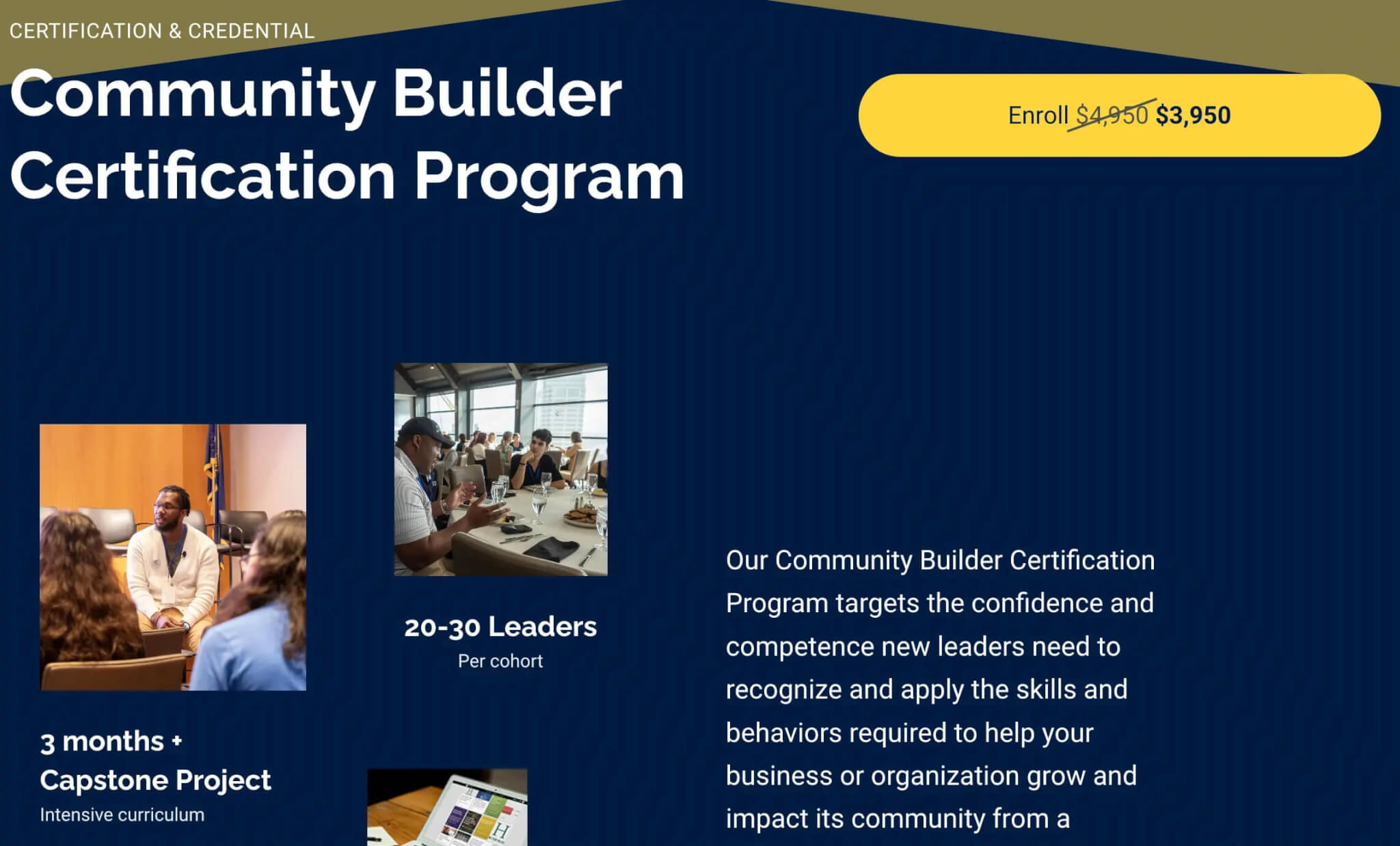
Know More is a DEI training agency that helps organizations build greater diversity, create inclusive workplaces, and uncover unconscious biases that impede inclusivity.
Course Overview + Outcome: This program helps leaders build their competence and confidence and recognize behaviors needed to grow the organization from an equitable perspective. Successful completion of this program prepares leaders to head diverse teams effectively. The training also equips you to address social issues affecting vulnerable populations and promote diversity, equity, inclusion, and belonging within the organization.
Price: $3,950
Who should attend: Leaders at all levels, HR professionals, or others who are responsible for or wish to take responsibility for diversity and inclusion in their organization.
Location/format: In-person workshops + online learning
Length: 3 months + Capstone Project
2
Leading Inclusive and Diverse Teams and Organizations by University of Michigan
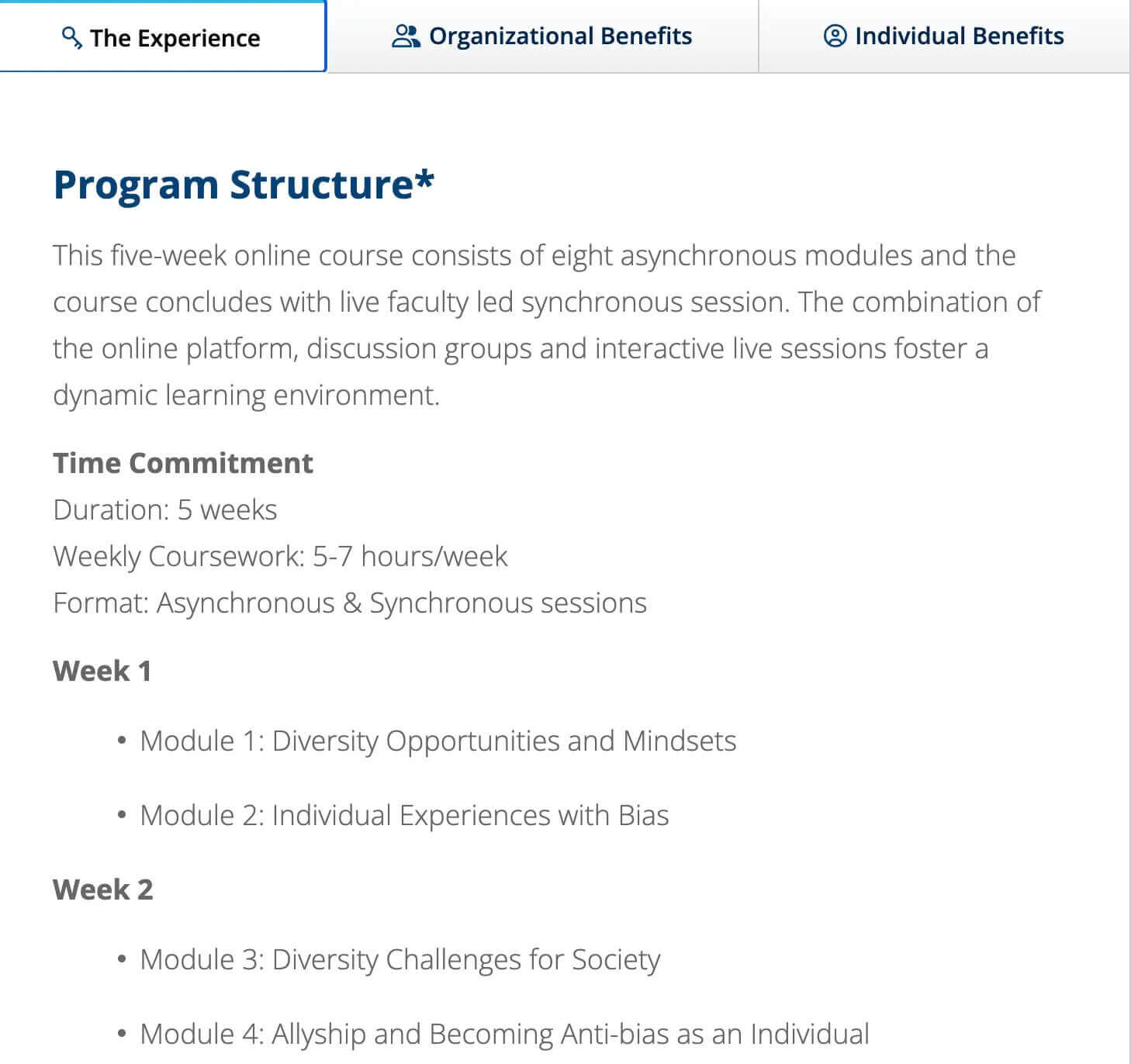
Course Overview: This program is for organizations that care about building and leading diverse and inclusive teams. Throughout this course, attendees will be taught by expert DEI trainers, who will help them gain personal awareness of how they show up in diverse settings. The program will also equip them with evidence-based tools for becoming better allies and change advocates. At the end of the course, your team will have learned better conflict management skills and how best to regulate emotions.
Price: $2,000
Who should attend: Team leaders, managers, and employees with desires to create and develop an accepting, diverse, and inclusive workplace.
Location/format: Asynchronous & Synchronous sessions
Length: 5 weeks
3
Diversity, Equity & Inclusion Certificate Program by American Management Association (AMA)
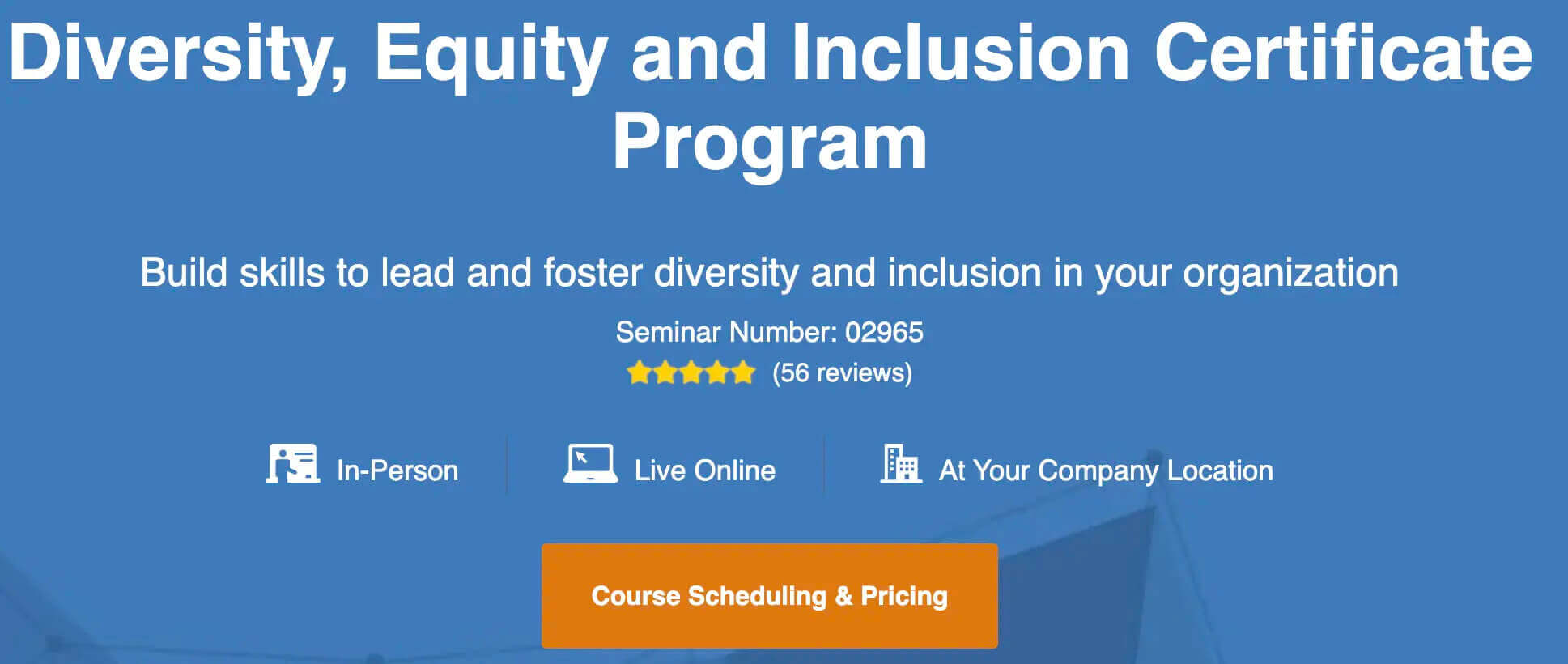
Course Overview: This is a 3-day certificate program for leaders at all levels to develop skills to become diversity champions and go beyond the standard DEI training. This course teaches attendees how to recognize and celebrate the uniqueness and individuality of each person in the organization and how to identify and understand hidden biases on a deeper level.
Price: $3,295 non-members/$2,995 AMA members
Who should attend: Leaders at all levels, HR professionals, or anyone who wants to take responsibility for diversity and inclusion in their organization.
Location/format: In-person/ Live Online/ On-site
Length: 3 days
DEI training FAQs
Are there ways to measure diversity and inclusion within an organization? If so, how?
Some areas that you can look at include the diversity of your staff; assess how varied your workers are in race, ethnicity, sexual orientation, and gender, and also how that diversity is spread across leadership teams. For inclusivity, measure employee engagement, retention rate, and happiness.
Does having a diverse organization help with employee retention?
Not on its own. People need to feel valued, connected and welcomed in an organization, and if they don’t, no level of diversity will make them stay.
How can a company promote diversity and inclusion within the organization?
Firstly, emphasize the importance of diversity and inclusion in the company during the hiring process and training sessions. Also, make sure there is a culture of accountability when it comes to DEI, so if employees behave in ways that don’t foster an inclusive workplace, they should be given instructions on how to correct their behavior.
What are the benefits of getting a DEI certification?
As an individual, DEI training helps you become more well-rounded. You gain a deeper understanding of the world around you and how you can help create a more just and equitable society. It also helps you build trust and credibility with your colleagues.
How can bias be eliminated from the hiring process?
Regardless of how good your intentions may be, when it comes to diversity and inclusion, some unconscious biases may creep in during the hiring process. To avoid this, your company can use a blind hiring process, which can include a blind resume practice, where you black out all the personal information on resumes—such as addresses, dates of birth, and gender —so that you’re not using these factors to evaluate candidates.
Create an Equitable, Diverse, and Inclusive Environment For Your Employees
DEI training will only be successful if you are intentional about it. To make sure it’s not one-and-done and truly engrained into the company culture, you need first to define what success looks like at the start of the training.
Also, make sure it is owned by C-suite executives and leaders on all levels to drive implementation. Include it in the company’s culture, encouraging inclusive behaviors, creating ongoing strategic initiatives, and having each training facilitated by trained professionals.
Diversity, equity, and inclusivity training begin at the onboarding stage; it is continuous, and you can always refine it along the way. Get started by leveraging a robust learning platform like LearnWorlds to host your organization’s training, or choose from one of our many courses and expand your knowledge on DEI initiatives.
Further reading you might find interesting:

Ipinmi Akinkugbe
Ipinmi is a content writer with over 3 years of experience in B2B writing for tech companies. With a strong love for the marketing and writing space, she is passionate about continuous learning and sharing knowledge. She is also a travel content creator, an avid reader, and an adventurer.

